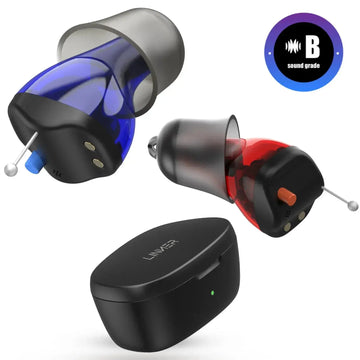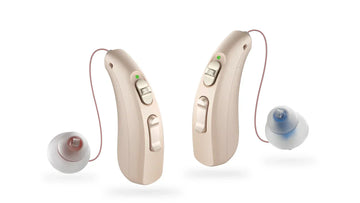Have you ever experienced a low or high ringing sound in your ears when the rest of the world was otherwise silent? If so, you are not alone. More than 50 million Americans are said to experience tinnitus, ringing, phantom sounds that the ear perceives, such as buzzing, humming, or hissing that don’t come from an obvious external source. Although it can be dismissed as “just ear noise,” tinnitus can disrupt sleep, concentration, and a person's emotional state.
What causes the proverbial ear ringing? The ringing itself can be caused by several factors, including, but not limited to, noise damage (hearing loss), age-related hearing loss, stress, or even a blockage of earwax. The good news is you don’t have to “just live with it.” You could, hearing aids, some sound therapy, and lifestyle changes to manage the sound.
What Is Ear Ringing? Knowing Tinnitus
Ear ringing (tinnitus) is the perception of sound occurring in the absence of an external auditory stimulus. It is most often described as many things, including:
● Ringing
● Buzzing
● Hissing
● Clicking
● Roaring
Tinnitus might be subjective (heard only by the individual and not a health care professional) or objective (rare, caused by an internal bodily function and detectable by a physician). Subjective tinnitus is documented in over 30% of people. The most common cause objective tinnitus is when it occurs because of movement and mutations of muscles in the head. Subjective tinnitus is reflected in other medical conditions of varying phases. Although tinnitus is not classified as a disease, it can be a symptom that indicates a different condition exists somewhere in the auditory system.
What Causes Ringing in the Ears?
Understanding what causes tinnitus is the first step toward dealing with it. While you may feel as though ear ringing comes from nowhere, tinnitus is most often caused by specific yet identifiable physical or emotional triggers.
Noise-Induced Hearing Loss
Obvious and not-so-obvious loud noises harm your ears. Whether it’s a concert, machinery, or the loudest noise from your headphones, sounds above 85-dBc increase your chances of damage to the hair cells within your inner ear. Inner ear hair cells are responsible for taking sound and converting it into electrical impulses our brain interprets as an auditory stimulus; once hair cells are damaged, there is no biological capability to regenerate them. This injury often results in hearing loss and triggers a ringing sound in the ears known as tinnitus. The best way to avoid permanent injury is to protect your ears, especially in very loud environments.
Age-Related Hearing Loss (Presbycusis)
The superstructures of the auditory system deteriorate over time in every human. The hairs and nerves in the inner ear as we age, especially once we hit age 60. This deterioration can present as swellings of the ear structure and diminished mechanics of the vibratory and auditory systems. Hearing loss is accompanied by the perception of ear ringing (tinnitus). Many older adults present with significant ringing in the ears and hearing loss of conversations in crowded rooms or high-frequency sounds.
Earwax Blockage
Earwax protects your ears. Earwax can catch dirt and bacteria from the outside world. When, however, earwax builds up too much, it can put pressure on the eardrum, put a damper on sounds heard, or create a temporary noise like ringing in the ears. A doctor can effectively remove excess wax and either issue will hopefully be resolved or get better. Do not try to use cotton swabs, as these push the wax deeper which can make it significantly worse.
Medications (Ototoxic Drug)
There are records of specific medications affecting the inner ear in a harmful way. Ototoxic medications are medications that include some antibiotics, such as gentamicin, anti-depressants, and large doses of pain relief medication,s such as aspirin. Normally, the mechanics of the human body would handle the inner ear. But we have medications that turn off the inner ear, affect the fluid balance, or cut the communication/signal of nerve activity in the ear, which can create the perception of tinnitus ringing or aural (an auditory sound) ringing perception in the ears. Side effects of medications are best reviewed with a doctor before planning to take a new medication.
Health Conditions
There are multiple medical issues associated with ear ringing. Ménière’s disease is an inner ear disorder. It provided the condition with vertigo, fluctuating ear hearing, or perceived sound in the ear. TMJ (temporomandibular joint disorders) involves jaw joints but can also create pain and increase pressure associated with the ear. Hearing ringing in the ears is sometimes caused by increased blood flow (or sound) to the ears. Hearing loss doesn't mean you have an illness. However, immobility of the head or neck resulting in whiplash or impact injuries can damage aural pathways in ways that invoke tinnitus.
Stress and Anxiety
Stress and anxiety do not cause tinnitus directly and simply increase the awareness of tinnitus or the perception of sound ringing noise in the ear.
When we experience anxiety, the brain becomes overly aware of auditory sensations, particularly ringing in the ears. Tinnitus can trigger a chain reaction. Once we become aware of our tinnitus, it raises our stress levels and increases the loudness of our tinnitus. Relaxation practices (like deep breathing) and therapeutic interventions can help disrupt this cycle of hyperawareness and tinnitus.

How to stop ringing in the ears: Treatment and Management?
Ringing in the ears can be distressing, but you don’t have to resign yourself to tinnitus. There is no “cure”, but there are established techniques that have been shown to decrease the loudness of the ringing and improve your quality of life.
Hearing Aids for Tinnitus Management
The most important option for someone with hearing impairment is their use of hearing aids. Hearing aids serve to amplify the outside world, allowing you to hear conversations and environmental sounds. Louder external sounds quickly detract from your attention on the internal ringing signal. Today’s hearing aids, such as the Linner Nova OTC Hearing Aids based on the dual technology, can provide features for tinnitus management. In addition to its amplification, it could allow the user the ability to calibrate the device to maximize hearing while simultaneously masking, to varying degrees, the residual ringing. For many individuals, this dual approach represents considerable progress towards improved quality of life.
Sound Therapy as a Distractor
Sound therapy, or retraining therapy, makes use of environmental sounds to directly “mask over” the tinnitus. White noise machines, nature sound applications, or a running fan can be sources of consistent background noise. The ambient audio will be able to interfere with the brain’s processing of any ringing sound present in the outer ear when introduced at a higher volume. Many users of sound therapy will implement this form of distraction during quiet times, like at bed time, in order to fall asleep more quickly.
Cognitive Behavioral Therapy (CBT) can help you mentally
Cognitive Behavioral Therapy deals with the mental anguish associated with tinnitus. CBT teaches you to attempt to change your negative thoughts regarding ear ringing to positive ones. Instead of thinking ear ringing is a threat, you now think of ear ringing in a neutral way. Over time, this relocates some of the frustration and anxiety about the condition. Therapists commonly combine CBT with relaxation exercises to extend the benefits of CBT.
Lifestyle Alternatives - Possible Triggers
There are easy things you can do daily to reduce the severity of related ringing. If you find yourself in a loud place, use earplugs or noise cancelling headphones to protect your ears. When you are drinking, limit the amount of caffeine, alcohol and nicotine that you consume, which can cause some individuals to experience worse symptoms. Stress relief practices, such as yoga or meditation may also help relax the nervous system. Eating a nutritious diet and getting good sleep routines, can also improve ear health in general.
Medical Options for Underlying Causes
Depending on what triggered your ear ringing, your doctor will suggest one or more of the possible options. If earwax blockage appears to be causing temporary tinnitus, then a professional ear cleaning may solve your problems. In the case that the side effects of taking medications (such as aspirin or certain antibiotics) cause dizziness and a ringing sensation, your doctor may advise changing to another medication that has a more suitable side effect profile. The same is true for managing health condition issues that are linked to causing your tinnitus. Health conditions that would fall in this area are high blood pressure (hypertension), cluster headaches and TMJ disorders.
Alternative options to consider
There are individuals from around the world that will try alternative programs, which can include accupunture and hypnotherapy. Research on these programs gives mixed evidence and may help by simply helping your body to relax and de-stress from the initial cause of ear ringing. Such as a dietary nutrient, such as Magnesium and Zinc supplementation are also very popular, however you should always check with a doctor before using it. Finally, be cautious of claims stating fixes, which may be misleading. Focus on what is best for you and choose options that are safe and less likely to harm, and keep track of what works.
Linner Nova Hearing Aids is a customizable hearing device with sound settings that can be used to enhance your tinnitus.

FAQ: What does ringing in your left or right ear mean?
Q: What does right ear ringing mean?
In regards to tinnitus and ringing ears, there is no medical distinction if it is the right ear or left ear. However, in folk lore, there exists many folkloric interpretations of the meaning associated with spiritual signs. In many cultures, the right ear ringing signifies praise or good new incoming.
Q: What does left ear ringing mean?
In the case of the left ear, there are many interpreations relative to warnings, omens, and bad new. For this left ear and right ear physical ringing in the medical sense, doesn’t really have a significance difference medically other then a case of unilateral (one ear) tinnitus case, likely earwax blockage and/or insignificant occlusive auditory pathologies (Tumors such as “Acoustic neuroma are rare”).
Summary
The ringing of tinnitus related sounds can be frustrating, confusing and scary, however knowing what caused the short-term, one-off or long-term ringing and what options there are to manage it can empower you to take charge of your life again. Whether using sound therapy programs, making small lifestyle changes, or adapting to smart hearing aids, relief is achievable. Before you act or start something new, consult your doctor or qualified health care provider to ensure you obtain the best option for your needs.
If you try to make sense of the ringing of ears, and closely follow the guidance of science-based tinnitus strategies, you may lessen the effect the ringing has on your life.
Check out Linner Nova Hearing Aids and their supporting programs in your hearing health journey.
Read More






